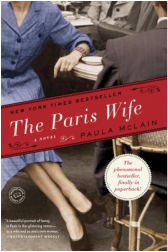
I'm obviously never going to write the next Great American Novel. I have neither screwed up my own life sufficiently, nor have I treated enough other people with callous disregard. Gotta work on that!
The Paris Wife is the story of Hadley Richardson, the woman who becomes Ernest Hemingway's first wife before he breaks into the literary world with such effect. And because of the self-indulgence of the Lost Generation, who figure prominently in this book, I wasn't sure I would be able to appreciate McLain's novel, but I enjoyed it immensely. I think that was in large part because it was really Hadley's story even more than Hemingway's, and her "normal" take on the interactions of that literary circle were more in line with my reactions. It's really hard to like Hemingway, Ezra Pound, or Scott Fitzgerald in this novel. They all treat people horribly--especially women--and truly believe in their superiority.
What I did enjoy, besides seing the history of this group through Hadley's filter (and the blurring lines of fiction), was the backstory, much of which is born out in the biographies of those involved, regarding how Hemingway's now-famous works came about. Much of this novel takes place while he's struggling to make his mark and the struggle he has in creating The Sun Also Rises.
If you can get past that the men are mostly misogynistic asshats (and some of the women are no better), it's a very interesting portrait of Hadley's life with Hemingway, the ultimate betrayal, and how it all affects his writing. In Hemingway's memoir, A Moveable Feast, which he wrote long after his marriage to Hadley ended, he made the remark that, despite having had four marriages, "I wished I had died before I loved anyone but her." Whether that's late-in-life romanticism or genuine regret for what he ruined, it gives us the sense of the impact Hadley continued to have on Hemingway right up until the point where he took his own life.
The Paris Wife is the story of Hadley Richardson, the woman who becomes Ernest Hemingway's first wife before he breaks into the literary world with such effect. And because of the self-indulgence of the Lost Generation, who figure prominently in this book, I wasn't sure I would be able to appreciate McLain's novel, but I enjoyed it immensely. I think that was in large part because it was really Hadley's story even more than Hemingway's, and her "normal" take on the interactions of that literary circle were more in line with my reactions. It's really hard to like Hemingway, Ezra Pound, or Scott Fitzgerald in this novel. They all treat people horribly--especially women--and truly believe in their superiority.
What I did enjoy, besides seing the history of this group through Hadley's filter (and the blurring lines of fiction), was the backstory, much of which is born out in the biographies of those involved, regarding how Hemingway's now-famous works came about. Much of this novel takes place while he's struggling to make his mark and the struggle he has in creating The Sun Also Rises.
If you can get past that the men are mostly misogynistic asshats (and some of the women are no better), it's a very interesting portrait of Hadley's life with Hemingway, the ultimate betrayal, and how it all affects his writing. In Hemingway's memoir, A Moveable Feast, which he wrote long after his marriage to Hadley ended, he made the remark that, despite having had four marriages, "I wished I had died before I loved anyone but her." Whether that's late-in-life romanticism or genuine regret for what he ruined, it gives us the sense of the impact Hadley continued to have on Hemingway right up until the point where he took his own life.
I'm not willing to become like Hemingway to create art, so I'm never going to have books written about me, and I'm ok with that. Nevertheless, The Paris Wife should be an interesting novel for anyone who's even familiar with Hemingway's work.
 RSS Feed
RSS Feed
